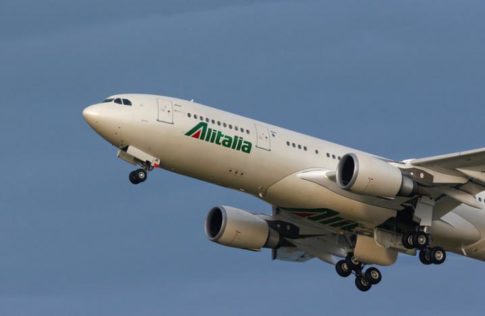– Italy’s National Carrier Alitalia Files For Bankruptcy:
As was widely expected, on Tuesday Italy’s national carrier Alitalia filed for its second bankruptcy in 9 years, after its board decided to formally ask the ministry of economic development to put the money-losing carrier, partly owned by UAE’s Etihad, under special administration after workers rejected its latest rescue plan meant to unlock much-needed financing.
As discussed previously, a majority of the company’s workers last week voted against a restructuring plan that envisaged cuts to jobs and salaries, making it impossible for the loss-making airline to secure funds to keep its aircraft flying. In retrospect, many more workers will now lost not only much of their compensation but also their jobs, even if for the time being the airline’s flight schedule would remain unchanged.
Once Alitalia is put under administration, the Rome government will appoint one or several commissioners who will assess whether it can be overhauled – either as a standalone company or through a partial or total sale – or should be wound up.
Quoted by Reuters, James Hogan, the CEO of Etihad Airways, which bought into Alitalia during the latest restructuring in 2014, said the Italian airline required “fundamental and far-reaching restructuring to survive and grow in future”.
“Without the support of all stakeholders for that restructuring, we are not prepared to continue to invest,” he said in a statement.
Meanwhile, the carrier is losing about €1 million ($1.1 million) a day and without government support risks running out of cash by the middle of May. The government has already thrown it a short-term lifeline, a bridging loan of up to 400 million euros to see it through the bankruptcy process.
Rival airlines including Lufthansa and Norwegian Air have shown little interest in buying Alitalia and creditors have refused to lend more money, putting more pressure on the government to find a way to save the flag carrier. The government has ruled out renationalising Alitalia, an airline that was once a symbol of Italy’s post-war economic boom but is now struggling to compete at home against low-cost carriers Ryanair and EasyJet
Outraged at repeated bailouts that have cost taxpayers more than 7 billion euros over a decade, many Italians are urging the government to resist the political temptation to rush to its rescue again.
But with a general election due by May 2018, few Italians believe the ruling Democratic Party (PD) will stand by and watch Alitalia crash and its 12,500 workers lose their jobs.A worst-case scenario was presented by Italy’s Economic Development Minister, who on Sunday said that a sudden collapse of the loss-making national carrier “would be a great shock for Italy’s economy.” Rome has given the crisis-hit airline a short-term lifeline, a bridge loan of up to €400 million to see it through a process whereby an administrator will decide if it can be sold as a going concern or should be liquidated.
However, it is the worst case outcome that has Italian government officials spooked. “A [sudden closure] would be a shock for GDP much greater than the scenario that we are looking at: a brief period of six months covered by a bridging loan from the government so as to find a buyer who could provide services that Italians need as travelers,” he said in an interview with Sky TG24 television.
Making matters worse, rival airlines have shown little interest in buying Alitalia and creditors have refused to lend more money after workers last Monday rejected the abovementioned rescue plan that would have reduced pay and cut 1,700 jobs. It is unclear how yet another “shock” to Italy’s GDP would reverberate across Europe, although even without this adverse development, Italy’s unemployment rose from 11.5% to 11.7% in March according to government data released earlier.
* * *
PayPal: Donate in USD
PayPal: Donate in EUR
PayPal: Donate in GBP
